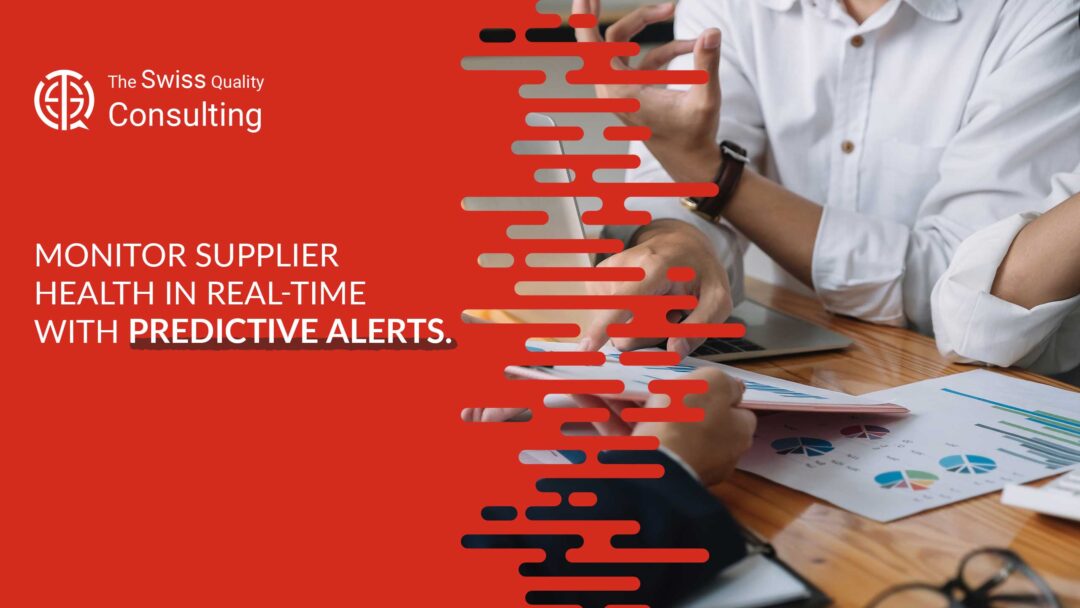Revolutionizing Supply Chain Management with Real-Time Supplier Health Monitoring
Introduction
In the fast-paced world of modern business, real-time supplier health monitoring with predictive alerts is becoming increasingly crucial for maintaining a robust and efficient supply chain. This article provides business executives, mid-level managers, and entrepreneurs with valuable insights into the importance and benefits of implementing real-time monitoring systems in their supply chain management.
The Criticality of Supplier Health in Business
In today’s interconnected and complex business landscape, where supply chains span across continents and involve numerous partners, supplier health has emerged as a critical factor in ensuring operational continuity, minimizing risks, and achieving sustainable success. Supplier health encompasses the overall performance, reliability, and financial stability of suppliers in a business’s supply chain. By proactively monitoring supplier health in real-time, organizations can gain valuable insights into their suppliers’ capabilities, identify potential issues that could disrupt the supply chain, and take timely interventions to mitigate risks and maintain operational stability.
Supplier health assessments go beyond traditional measures of cost and delivery performance; they delve into deeper aspects of supplier capabilities, including:
Financial Stability: Assessing the supplier’s financial health, including creditworthiness, debt-to-equity ratio, and cash flow stability, to ensure they can meet their obligations.
Operational Capacity: Evaluating the supplier’s production capacity, inventory management practices, and ability to meet demand fluctuations without compromising quality or delivery timelines.
Quality Management: Assessing the supplier’s quality control processes, defect rates, and adherence to product specifications to ensure consistent delivery of high-quality goods or services.
Compliance and Regulatory Adherence: Evaluating the supplier’s compliance with industry regulations, environmental standards, and ethical sourcing practices to mitigate legal and reputational risks.
Risk Management: Assessing the supplier’s risk management practices, contingency plans, and business continuity strategies to prepare for potential disruptions, such as natural disasters, geopolitical events, or economic downturns.
Real-time monitoring of supplier health empowers organizations to proactively identify and address potential issues, preventing disruptions before they occur. This proactive approach offers numerous benefits, including:
Reduced Supply Chain Disruptions: By identifying and mitigating potential supplier risks, organizations can minimize supply chain disruptions, ensuring a steady flow of goods or services to meet customer demand.
Enhanced Cost Control: Proactive supplier management can help organizations negotiate better terms, identify cost-saving opportunities, and avoid costly supply chain disruptions that lead to price fluctuations.
Improved Quality and Consistency: By monitoring supplier performance and addressing quality issues promptly, organizations can maintain consistent product or service quality, enhancing customer satisfaction and brand reputation.
Reduced Reputational Risks: Proactive supplier management can help organizations identify and mitigate potential ethical or environmental issues associated with their suppliers, protecting their reputation and brand image.
Strengthened Supply Chain Partnerships: By engaging with suppliers proactively and addressing concerns collaboratively, organizations can build stronger relationships with their suppliers, fostering trust and long-term partnerships.
In essence, supplier health has become an indispensable element of supply chain management, enabling organizations to navigate the complexities of global sourcing, mitigate risks, and ensure the smooth flow of goods or services that are essential for their success. By embracing real-time monitoring and proactive supplier engagement, organizations can safeguard their supply chains, enhance operational resilience, and achieve sustainable growth in the ever-evolving world of business.
Proactive Risk Management
Real-time monitoring enables businesses to proactively manage risks by providing early warnings about supplier issues, such as financial instability, delivery delays, or quality problems, before they escalate into major challenges.
Role in Change Management
Incorporating real-time supplier health monitoring is vital in change management strategies. It equips businesses with the necessary tools to adapt quickly to changes in the supply chain, ensuring resilience and flexibility in times of transition.
Ensuring Smooth Supply Chain Transitions
Effective change management in the supply chain necessitates a keen awareness of each supplier’s status, which is made possible through real-time monitoring systems.
Impact on Executive Coaching and Leadership
Leadership and decision-making are significantly enhanced by real-time supplier health monitoring. Executive coaching programs now emphasize the importance of data-driven decision-making in supply chain management, encouraging leaders to embrace technological solutions like real-time monitoring.
Developing Data-Driven Leadership
Leaders are trained to use real-time data for making informed decisions, ensuring that supply chain strategies are both responsive and resilient.
Effective Communication in Supply Chain Management
Communication plays a critical role in managing supplier relationships. Real-time monitoring systems enhance communication by providing accurate, up-to-date information, facilitating more effective and collaborative supplier interactions.
Strengthening Supplier Partnerships
Timely and transparent communication fostered by real-time data strengthens partnerships, creating a more cohesive and reliable supply chain.
Generative AI in Supplier Monitoring
Generative Artificial Intelligence (AI) is transforming supplier health monitoring. AI systems can analyze large volumes of data from various sources, providing predictive insights that help businesses anticipate and respond to potential supply chain disruptions.
AI-Driven Predictive Analytics
AI-driven analytics in real-time monitoring systems can predict potential supplier issues, allowing businesses to take preemptive actions to avoid disruptions.
Conclusion
In conclusion, real-time supplier health monitoring is not just a technological innovation; it’s a strategic necessity for businesses seeking to optimize their supply chain operations. It provides a critical edge in maintaining efficiency, managing risks, and ensuring business continuity.
#SupplierHealthMonitoring, #SupplyChainManagement, #RealTimeData, #PredictiveAnalytics, #BusinessStrategy









